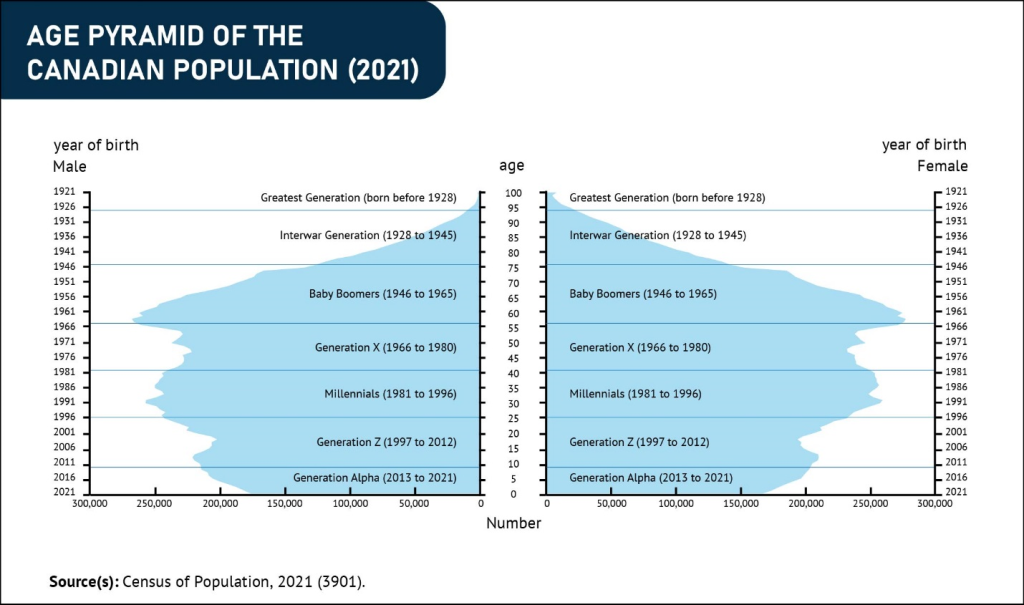Age & Fragility

Statistics Canada. “A generational portrait of Canada’s aging population from the 2021 Census,” April 27, 2022.
by David Haberstock
We all love to complain about aches and pains as we age, at least until the aches and pains are strong enough that we say with the author of Ecclesiastes that the days are such that “I have no pleasure in them” (12:1). As we age and our capacities decline we feel increasingly fragile. This is true of our bodies, our institutions, and nations. And both Canada and the world are rapidly aging right now.
Many congregations also feel fragile right now. I believe that this is due to the relative age of most of our congregations and the people who keep them going. In recent years many have looked at those trends and wondered if we are failing or why the Lord has removed His blessing from us.
However, I want you to look at the graph that accompanies this article. It is from Statistics Canada and is based on 2021 census data. In it, you can clearly see that the birth year 1965 (the end of the baby boom in Canada) is still—despite attrition—the largest age cohort in our nation. Since then, we have never had as many babies. These figures include all residents or citizens of Canada, regardless of birthplace. That means that year by year, as immigration has increased, our country has seen even fewer babies born in Canada than the figures since 1965 suggest.
If not for newcomers fleshing out those smaller age cohorts, what might Canada’s age pyramid look like?
My suspicion is that Canada would look like most of our congregations. A lot of grey hair, with a few singles and families of varying ages. To be sure, secularism and a falling away from faith and an active practice of faith in the last 50 years causes many of our congregations to look leaner too. If all our members attended regularly, the age pyramid of our congregations would be a lot closer to that of the graph. But if you’ve been wondering why your Sunday School and pews aren’t as full as they once were, consider this graph and how it reflects our own life choices individually and as a society.
Many congregations also feel fragile right now. I believe that this is due to the relative age of most of our congregations and the people who keep them going. In recent years many have looked at those trends and wondered if we are failing or why the Lord has removed His blessing from us.
This inverted age pyramid means that the church is not alone in this feeling of fragility. All of Canada is rapidly aging, and institutions and organizations that depend on volunteers are, across the board, having a much harder time finding those volunteers. This impacts the job market also.
As the chart notes, in the last fifteen years the birthrate in Canada has plummeted further. Look how many fewer children there are compared to adults, let alone compared to their grandparents! We are a society swimming in grandparents these days.
Has that feeling of fragility in your congregation begun to be a generalized feeling in society as well? If it hasn’t yet, it soon will, as fewer and fewer people are available to do all the jobs that need doing. The days may come to our nation in which we say, “I have no pleasure in them.”
As our whole society ages and contracts, there will be economic and institutional aches and pains. It will hit all sectors in the days ahead. Universities, which are bigger than they’ve ever been, will contract. Schools, which generally have been amalgamating and getting bigger, will be emptier and may downsize in the future. The emptying pews are merely the canary in the coal mine.
We are going back to a time that is similar to our founding era as a country, and as a church—though for opposite reasons. In the founding of Lutheran Church–Canada’s (LCC) Central Region, pastors often tended to vast swaths of the countryside, pulling together small groups of Lutherans newly settled in disparate fledgling towns. Now pastors are beginning to do the same again, tending to vast swaths of the countryside, gathering together and keeping spiritually fed small groups of Christians who remain in declining towns.

Of course, there are instances of the other trend too: for example, our Oromo brothers and sisters who are gathering together as churches where they settle and often turn to LCC congregations for places to worship, for pastoral training, and for spiritual community. But generally speaking, what lies before us is the decline that you see written in the demographic (inverse) pyramid of Canada.
As this demographic shrinkage hits our society, it will bring with it a lot of angst on top of the cultural decay we’ve all witnessed. This is an incredible opportunity for the Church to share the Gospel! For Jesus will guide us through this moment too, just as He has guided and shepherded His Church of every age. Our present fragility He meets with His enlivening Spirit.
———————
Rev. David Haberstock is Lutheran Church–Canada (LCC)’s Central Regional Pastor.





